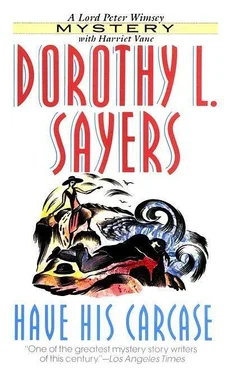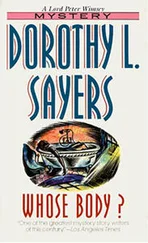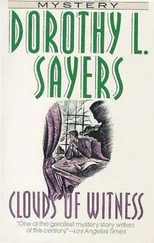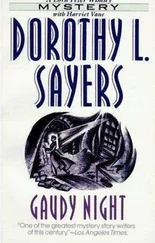‘Are you all right?’
The man said nothing and she pulled upon the shoulder. It shifted slightly — a dead weight. She bent over and gently lifted the man’s head.
Harriet’s luck was in.
It was a corpse. Not the sort of corpse there would be any doubt about, either. Mr Samuel Weare of Lyons Inn, whose ‘throat they cut from ear to ear’, could not have been more indubitably a corpse. Indeed, if the head did not come off in Harriet’s hands, it was only because the spire was intact, for the larynx and all the great vessels of the neck had been severed ‘to the hause bone’, and a frightful stream, bright red and glistening, was running over the surface of the rock and dripping into a little hollow below.
Harriet put the head down again and felt suddenly sick.
She had written often enough about this kind of corpse, but meeting the thing in the flesh was quite different. She had not realised how butchery the severed vessels would look, and she had not reckoned with the horrid halitus of blood, which streamed to her nostrils under the blazing sun. Her hands were red and wet. She looked down at her dress. That had escaped, thank goodness. Mechanically, she stepped down again from the rock and went round to the edge of the sea. There she washed her, fingers over and over again, drying them with ridiculous care upon her handkerchief. She did not like the look of the red trickle that dripped down the face of the rock into the clear water. Retreating, she sat down rather hastily on some loose boulders.
‘A dead body,’ said Harriet, aloud to the sun and the seagulls. ‘A dead body. How — how appropriate!’ She laughed.
‘The great thing,’ Harriet found herself saying, after a pause, ‘the great thing is to keep cool. Keep your head, my girl. What would Lord Peter Wimsey do in such a case? Or, of course, Robert Templeton?’
Robert Templeton was the hero who diligently detected between the covers of her own books. She dismissed the image of Lord Peter Wimsey from her mind, and concentrated on that of Robert Templeton. The latter was a gentleman of extraordinary scientific skill, combined with almost fabulous muscular development. He had arms like an orang-outang and an ugly but attractive face. She conjured up his phantom before her in the suit of rather loud plus-fours with which she was accustomed to invest him, and took counsel with him in spirit.
Robert Templeton, she felt, would at once ask himself, ‘Is it Murder or Suicide?’ He would immediately, she supposed, dismiss the idea of an accident. Accidents of that sort. donot happen. Robert Templeton would carefully examine the body, and pronounce
Quite so; Robert Templeton would examine the body. He was, indeed, notorious for the sang-froid with which he examined bodies of the most repulsive description. Bodies reduced to boneless jelly by falling from aeroplanes; bodies charred into ‘unrecognisable lumps’ by fire; bodies run over by heavy vehicles, and needing to be scraped from the road with shovels — Robert Templeton was accustomed to examine them all, without turning a hair. Harriet felt, that she had never fully appreciated the superb nonchalance of her literary offspring.
Of course, any ordinary person, who was not a Robert Templeton, would leave the body alone and run for the police. But there were no police. There was not a man, woman or child within sight; only a small fishing-boat, standing out to sea some distance away. Harriet waved wildly in its direction, but its occupants either did not see her or supposed that she was merely doing some kind of reducing exercise. Probably their own sail cut off their view of the shore, for they were tacking up into the wind, with the vessel lying well over. Harriet shouted, but her voice was lost amid the crying of the gulls.
As she stood, hopelessly calling, she felt a wet touch on her foot. The tide had undoubtedly turned, and was coming in fast. Quite suddenly, this fact registered itself in her mind and seemed to clear her brain completely:
She was, as she reckoned, at, least eight miles from Wilvercombe, which was the nearest town. There might be a few scattered houses on the road, but they would probably belong to fishermen, and ten to one she would find nobody at home but women and children, who: would be useless in the emergency. By the tune she had hunted up the men and brought them down to the shore, the sea would very likely have covered the body. Whether this was suicide or murder, it was exceedingly necessary that the body should be examined, before everything was soaked with water or washed away. She pulled herself sharply together and walked firmly up to the body.
It was that of a young man, dressed in a neat suit of dark-blue serge, with’ rather over-elegant, narrow-soled brown shoes, mauve socks and a tie which had also been mauve before it had been horridly stained red. The hat, a grey soft felt, had fallen off — no, had been taken off and laid down upon the rock. She picked it up and looked inside, but saw nothing but the maker’s name. She recognised it as that of a well-known, but not in the best sense, famous, firm of hatters.
The head which it had adorned was covered with a thick and slightly too-long crop of dark, curly hair, carefully trimmed and smelling of brilliantine. The complexion was, she thought, naturally rather white and showed no signs of sunburn. The eyes, fixed open in a disagreeable stare, were blue. The mouth had fallen open, showing two rows of carefully-tended and very white teeth. There were no gaps in the rows, but she noticed that one of the thirteen-year-old molars had been crowned. She tried to guess the exact age of the man. It was difficult, because he wore very unexpectedly — a short, dark beard, trimmed to a neat point. This made him look older, besides giving him a somewhat foreign appearance, but it seemed to her that he was a very young man, nevertheless. Something immature about the lines of the nose and face suggested that he was not much more than twenty years old.
From the face she passed on to the hands, and here she was again surprised. Robert Templeton or no Robert Templeton, she had, taken for granted that this elegantly dressed youth had come to this incongruous and solitary spot to commit suicide. That being so, it was surely odd that he should be wearing gloves. He had lain doubled up with his arms’ beneath him, and the gloves were very much stained. Harriet began to draw off one of them, but was overcome by the old feeling of distaste. She saw that they were loose chamois gloves of good quality, suitable to the rest of the costume.
Suicide with gloves on? Why had she been so certain that it was suicide? She felt sure she had a reason.
Well, of course. If it was not suicide, where had the murderer gone? She knew he had not come along the beach from the direction of Lesston Hoe, for she remembered that bare and shining strip of sand. There was her own solitary line of footprints, leading across from the shingle. In the
Wilvercombe direction, the sand was again bare except for a single track of footmarks — presumably those of the corpse.
The man, then, had come down to the beach, and he had come alone. Unless his murderer had come by sea, he had been alone when he died. How long had he been dead? The tide had only turned recently, and there were no keel-marks on the sand. No one, surely, would have climbed the seaward face of the rock. How long was it since there had been a sufficient depth of water to bring a boat within easy reach of the body?
Harriet wished she knew more about times and tides. If Robert Templeton had happened, in the course of his brilliant career, to investigate a sea-mystery, she would, of course, have had to look up information on this point. But she had always avoided sea-and-shore problems, just precisely on account of the labour involved. No doubt the perfect archetypal Robert Templeton knew all about it, but the knowledge was locked up within his shadowy, and ideal brain. Well, how long had the man been dead, in any case?
Читать дальше












